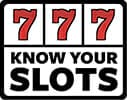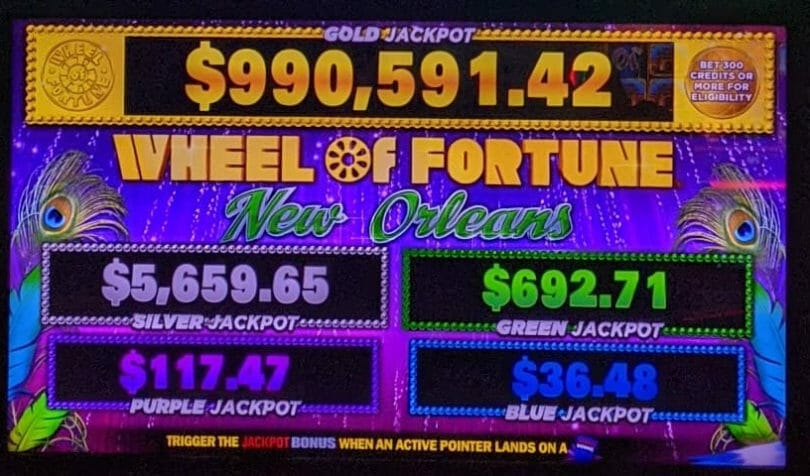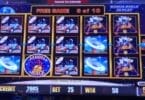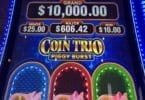Regular reader EV Bandit has weighed in on pieces I’ve written in the past, usually offering an additional perspective to a different aspect of a topic I raised. In a piece I wrote about how low slot payouts can go, they noted the impact of a game’s design on overall payback.
It’s a different aspect of the topic that I didn’t broach, and I thought a separate piece on the topic was more worthwhile than burying the ideas in the comments. Their comments came in two parts (I did a bit of editing to tighten it up but the main points were left as is). Here’s part one:
Your article misses a key point: Slots that offer one or more progressive jackpots.
The RTP (return to player) calculation assumes the player hits that jackpot(s) because someone will. If the player never hits any jackpot(s), that person is effectively playing a much worse version of the same game.
Suppose the game has a RTP of 87% and has a progressive jackpot at reset is worth 10%. Said differently, if a player never hit the jackpot, the player is effectively playing a 77% RTP game.
I used to play IGT Red Hot Jackpots with multiple progressives when it came out; the catch was you had to play $5 in this casino to qualify for the jackpots. I played the game because the short-coin players (those playing less than max coins) could never hit the jackpots (e.g. they don’t qualify).
In summary, the short-coiners were playing a slot machine with an effective RTP at much less than theoretical RTP.
Two ideas are raised here. First – if you’re not playing max coins when you need to to win a jackpot, you’re choosing to lower your payback. This is a point I’ve raised on the site elsewhere on articles about when to max bet, such as Quick Hit, and did not incorporate in the payback conversation because that’s a player choice.
However, the second idea is one I’ve mentioned in passing, such as in conversations of slot volatility around things like features and progressives, but have not given a full topic devotion to, which is the idea of how progressives takes money out of the base games.
EV Bandit is correct that if you’re playing a game where the progressives have an outsized impact on the game’s overall payout, and they don’t pay often enough for players to encounter them often, that can make for a really tough game for most players. His second comment covers that aspect quite well:
1) Elusive hand or win. Best way to understand this is Video Poker. 9/6 JoB returns roughly 99.5%. However, the elusive RF (royal flush) returns roughly 2% so if you never hit any RF, the person is effectively playing a 97.5% game despite expectations or RTP of 99.5%.
2) You see this same phenomenon a lot in Bonus Slot Machines with progressive Jackpots or special elusive wins:
– Take Star Goddess, the RTP assumes you hit both Supreme & Mega.
– Take Treasure Chest, you have to hit the Mega (Blue) or Major (Red), etc. to get the full RTP.
– Take Wish Mistress (50,000 credits), Golden Jungle Grand (10,000 credits) or Scarab Grand ($1,000) as a special award for the rare blackout win.
– WoF 4D: matching Gold Bars in progressive Jackpots … seriously, how many people matched 3 Gold Bars at $3+ wagers.In summary, the theoretical RTP is the theoretical RTP, but the realizable RTP is usually less. That theoretical RTP is more myth than reality for the majority of the player base. Again, the difference between theoretical RTP and realizable RTP can be quite large.
So this is where I’ve mentioned in various articles the point that if games have big progressives that rarely pay, this can come to bite you in the form of lower payback much of the time.
That one player who wins the $10,000+ grand on an 88 Fortunes/Dancing Drums style machine is technically realizing the full RTP of the game… but they’re also getting a chunk of payout from every other player who who helped fuel that progressive and got nothing. So the realizable RTP for that one player will be vastly different than nearly everyone else.
Players may not necessarily know what percentage of the overall payback is going to those progressives, but it’s fair to assume the bigger the progressives are, the less likely it is you’re going to hit one in any average session, and as such that will impact your overall payout.
That’s one reason why I’ve recommended in the past to players who wish to find a game that’s not as tough to look for either no progressives or small progressives, and a lower top payout. Is a $10,000 progressive exciting to win? Of course. Are you going to win it? The odds are certainly against you, not only to win that, but to achieve the game’s full payout range in any short term.
The Video Poker example is one I’ve also referenced here – that 2% payback anchored in the Royal Flush comes only once every 40,000 hands on average, and averages mean you might see a couple in short succession and then none for a long time (which is, unfortunately, what my case has been in recent years). But that’s 2% of your payout on a game that’s generally at a much higher payout to begin with.
Slots, especially if you’re playing lower denomination, has a lower overall payout expectation, and could easily put more than 2% to the big payouts. And unlike Video Poker, where the payback is reported right on the pay table, you won’t know what the actual payout of the game is, nor how much of it goes into the progressives, unless you happen to trip across information by chance or have access to more private information such as a game’s PAR sheet.
So players should keep that in mind as they pick their games as well – games with progressives look exciting, but you pay for that excitement when you don’t land those progressives.








